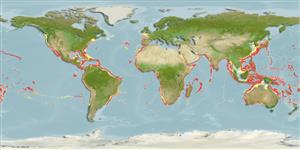Common names from other countries
Environment: milieu / climate zone / depth range / distribution range
Ecologie
marien benthopelagisch; oceanodroom (Ref. 51243); diepte 80 - 800 m (Ref. 2683), usually 300 - 400 m (Ref. 5217). Subtropical; 50°N - 36°S, 180°W - 180°E
Tropical and warm temperate waters of all oceans, but absent from eastern Pacific except at Sala y Gomez Ridge.
Lengte bij maturiteit / Grootte / Gewicht / Leeftijd
Maturity: Lm 47.4 range ? - ? cm
Max length : 100.0 cm SL mannelijk / geslacht onbekend; (Ref. 6181); common length : 40.0 cm SL mannelijk / geslacht onbekend; (Ref. 3403)
Dorsale stekels (totaal) : 18 - 20; Dorsale zachte stralen (totaal) : 17 - 20; Anale stekels: 2 - 3; Anale zachte stralen: 15 - 17. Body moderately elongate. Mouth with fang-like teeth. Spinescent gill rakers on the first arch with 1 - 3 cusps and many small spines; the angular raker long and triple-rooted. Body entirely scaled at over 20 - 25 cm SL. Pyloric caeca 7 or 8. Color is grayish to copper brown; fins blackish at over 40 cm SL, yellowish with black tips in smaller specimens (the first dorsal fin with a black blotch on two anteriormost membranes); the buccal and branchial cavities are black. Pelvic fin reduced to one spine that becomes entirely absent in specimens more than 40 cm SL.
Found at continental slopes, around oceanic islands and submarine rises (Ref. 6181). Meso-benthopelagic (Ref. 58302). Migrate to midwater at night (Ref. 6181). Feed on fish, cephalopods and crustaceans (Ref. 6181). Eggs and larvae are pelagic (Ref. 6766).
Probably spawns throughout the year in warmer seas.
Nakamura, I. and N.V. Parin, 1993. FAO Species Catalogue. Vol. 15. Snake mackerels and cutlassfishes of the world (families Gempylidae and Trichiuridae). An annotated and illustrated catalogue of the snake mackerels, snoeks, escolars, gemfishes, sackfishes, domine, oilfish, cutlassfishes,. scabbardfishes, hairtails, and frostfishes known to date. FAO Fish. Synop. 125(15):136 p. (Ref. 6181)
Status op de Rode Lijst van het IUCN (Ref. 130435)
CITES (Ref. 128078)
Not Evaluated
Gevaar voor de mens
Reports of ciguatera poisoning (Ref. 31637)
Gebruik door de mens
Visserij: visserij voor eigen gebruik; sportvis: ja; aas: usually
Tools
Speciale rapporten
Download XML
Internetbronnen
Estimates based on models
Preferred temperature (Ref.
115969): 8.6 - 16.5, mean 11.1 (based on 329 cells).
Fylogenetische diversiteitsindex (Ref.
82804): PD
50 = 1.0000 [Uniqueness, from 0.5 = low to 2.0 = high].
Bayesian length-weight: a=0.00363 (0.00224 - 0.00588), b=3.06 (2.92 - 3.20), in cm Total Length, based on LWR estimates for this species & (Sub)family-body (Ref.
93245).
Trofisch niveau (Ref.
69278): 4.2 ±0.57 se; based on food items.
Weerstandsvermogen (Ref.
120179): Gemiddeld, minimale populatieverdubbelingstijd 1,4-4,4 jaar (K=0.17-0.18; tm=4).
Fishing Vulnerability (Ref.
59153): High vulnerability (58 of 100).
Climate Vulnerability (Ref.
125649): Moderate vulnerability (39 of 100).
